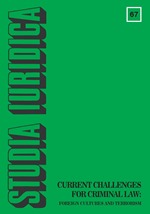Prawo autorskie a zwalczanie nieuczciwej konkurencji – uwagi na tle wyroku Sądu Najwyższego z 27 lutego 2009 roku, V CSK 337/08
Copyright and unfair competition law – comments on the decision of the Supreme Court of 27 February 2009, V CSK 337/08
Author(s): Krzysztof WojciechowskiSubject(s): Essay|Book Review |Scientific Life
Published by: Wydawnictwa Uniwersytetu Warszawskiego
Keywords: wyrok Sądu Najwyższego z 27 litego 2009 roku; V CSK 337/08' prawo autorskie a zwalczanie nieuczciwej konkurencji; pojęcie utworu w prawie autorskim; ustawa o zwalczaniu nieuczxciwej konkurencji;
Summary/Abstract: The article refers to two fundamental issues of intellectual property protection, raised in the decision of Polish Supreme Court of 27 February 2009: notion of a “work” as a subject matter of copyright; and supplementary protection of intellectual achievements under unfair competition law. The Court assessing copyrightability of the specification of essential terms of the contract in public procurements decided that it may fulfil conditions for a work under Polish copyright act and that also the protection under unfair competition law is possible, as parasitic act subsisting in the use of the ready result of competitor’s work could be contrary to good morons (dobre obyczaje). The author takes a critical look at these theses. Having referred to different models of defining works under copyright laws in Europe and the solution in the EU law, author analyses two basic requirements of a work under Polish copyright act, i.e. “creative activity” and “individual character” (originality). When the functional nature of a result (as is the case with a procurement specification) determines its content and composition, and normally leads to use of banal choice of words, phrases, sentences and the whole is systematized under standard terms, it is unlikely that such a result would qualify as a work, in lack of individuality. The broad concept of parasitic competition, adopted by the Court, is also excessive. While it is possible to counteract certain unfair takeover of achievements under Polish unfair competition law, even without the risk of confusion, it requires the existence of additional (other than conditions for intellectual property rights) and special circumstances. Mere use of the result of someone else’s work (“reaping without sowing”) is not sufficient. According to the author those special circumstances are: competitive specificity of the achievement; substantiality of takeover; wrongdoing in takeover. An imitation of someone else’s procurement specification may meet these requirements, which has to be proved by the plaintiff. In conclusion, author notes that broad copyright protection, based on liberal model of a work, and broad protection against “parasitism” under unfair competition law are difficult to reconcile. If practically all non-copied results of “skill, labour, judgement or investment” are to be protected by the copyright, there is hardly any space and need for a supplementary protection of achievements under unfair competition. Such a protection is indeed needed and justified when copyright protection is limited to only those results of creative activities that are individual (original).
Journal: Studia Iuridica
- Issue Year: 2011
- Issue No: 53
- Page Range: 291-307
- Page Count: 17
- Language: Polish

